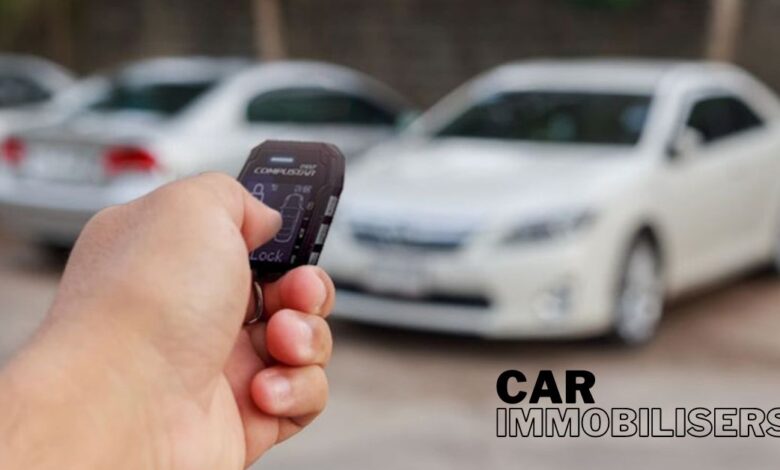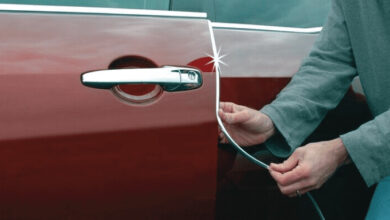Anti-theft Passive Immobilizer and its Impact on Car Security?

An anti-theft passive immobiliser is a technologically advanced security feature designed to protect vehicles from theft. It’s a significant development in the automotive industry, offering enhanced protection and peace of mind for vehicle owners. Vehicle theft has been a concern since the inception of automobiles. A passive immobiliser is an electronic device that prevents a vehicle from starting unless the correct key or key fob is use. 4D number plate play an important role in the improvement of anti-theft passive immobilisers. Let’s give some time and take a look into the concept of a passive immobiliser, its functioning, benefits, and the broader impact it has on car security.
Functioning of Passive Immobilisers:
Passive immobilisers rely on a secure communication protocol between the key fob and the ECU. Each key fob is embedded with a unique electronic code that is recognised by the vehicle’s immobiliser system. When the driver attempts to start the vehicle, the immobiliser system sends a challenge signal to the key fob. The key fob responds with the correct encrypted code, allowing the vehicle to start if the response matches the expected code. This process ensures that only authorised key fobs can start the vehicle, making it extremely difficult for thieves to hotwire or start the car using unauthorised methods.
Benefits of Passive Immobilisers:
The implementation of passive immobilisers has revolutionised car security in several ways. Let’s take a look at the most important ways
1. Deterrent Effect:
Passive immobilisers have had a notable deterrent effect on vehicle theft. Additionally, the mere knowledge that a vehicle is equipped with this advanced security measure acts as a powerful deterrent to potential thieves. Furthermore, the complexity of the technology and the difficulty in bypassing it discourage unauthorized access attempts. Consequently, this psychological barrier contributes significantly to reducing theft rates, as criminals are more likely to avoid targeting vehicles with passive immobilisers.
2. Enhanced Theft Protection:
Enhanced theft protection is a hallmark of passive immobilisers, setting them apart from conventional security measures. By integrating advanced encryption and authentication processes, these immobilisers create an impregnable barrier against unauthorised access. Additionally, the technology’s ability to automatically detect and communicate with authorised key fobs ensures that only legitimate users can start the vehicle. This not only minimises the risk of vehicle theft but also adds an additional layer of convenience for drivers, eliminating the need for manual activation of security systems.

3. Seamless User Experience:
The implementation of passive immobilisers has notably contributed to a seamless user experience in modern vehicles. Gone are the days of fumbling for keys or inputting security codes; now, drivers can effortlessly approach their vehicles, carry the key fob, and simply start the engine with minimal interaction. This convenience has become a hallmark of contemporary car security. Ensuring that the protection provide is robust without inconveniencing the user. The seamless integration of passive immobilisers into the daily routine of vehicle owners has elevated the overall driving experience. Thereby making security an unobtrusive yet integral part of their journey.
4. Insurance Benefits:
Vehicles equipped with passive immobilisers offer substantial insurance benefits. Consequently, these advanced security systems significantly reduce the risk of theft, leading to decreased insurance premiums for car owners. Furthermore, insurance companies recognize the effectiveness of passive immobilisers in thwarting unauthorized access and theft attempts. As a result, they often provide policyholders with lower rates, reflecting the decreased likelihood of filing theft-related claims. This mutual advantage encourages more drivers to invest in vehicles with this technology, fostering a safer environment for both insurers and car owners while promoting the broader adoption of innovative security measures in the automotive industry.
5. Reduced Vehicle Theft Rates:
The implementation of passive immobilisers in modern vehicles has led to a remarkable reduction in vehicle theft rates. By rendering traditional theft methods obsolete and requiring the use of authorised key fobs. These advanced security systems have created a significant deterrent for would-be thieves. The decline in successful theft attempts has not only provided car owners with enhanced peace of mind but has also contributed to safer communities. Additionally, it has decreased financial burdens on both individuals and insurance companies.
6. Technological Advancements:
Technological advancements in the field of vehicle security have propelled the evolution of passive immobilisers. Enhanced encryption algorithms, biometric authentication, and geofencing capabilities have fortified these systems. Modern passive immobilisers can now resist sophisticated relay attacks through signal distance limitations and frequency hopping mechanisms. As the automotive industry embraces connectivity and the Internet of Things. Passive immobilisers are poised to become integral components of comprehensive vehicle security ecosystems, continually adapting to emerging threats and ensuring the safety of vehicles and their owners.
7. Integration with IoT:
The integration of passive immobilisers with the Internet of Things (IoT) has expanded the horizons of vehicle security. Through this integration, vehicle owners can now remotely monitor and control their car’s security status using smartphone apps and other connected devices. Additionally, real-time notifications provide updates on any security breaches or unauthorised access attempts. This seamless connectivity also enables features like remote locking and unlocking, tracking the vehicle’s location, and disabling the engine in case of theft.





